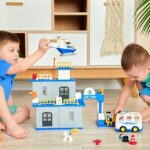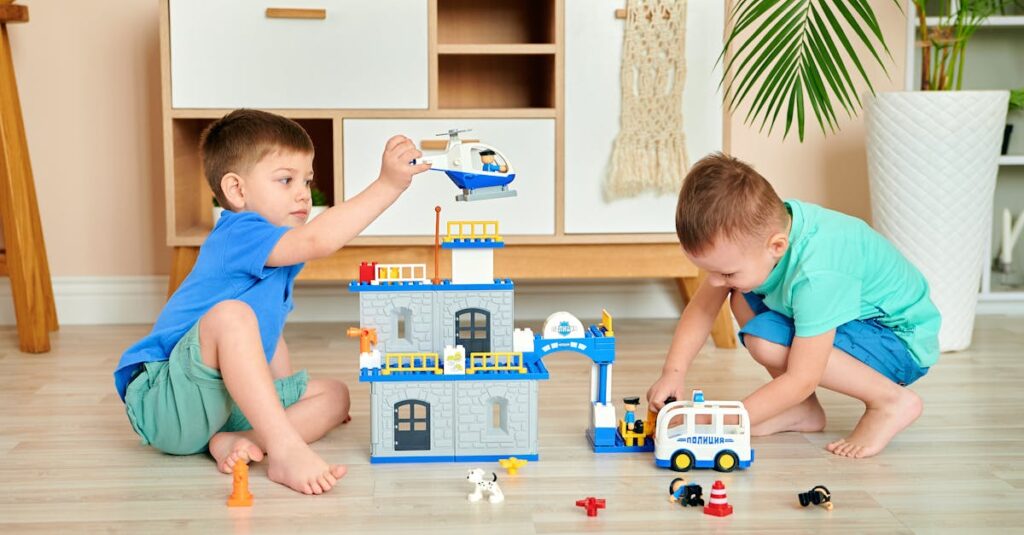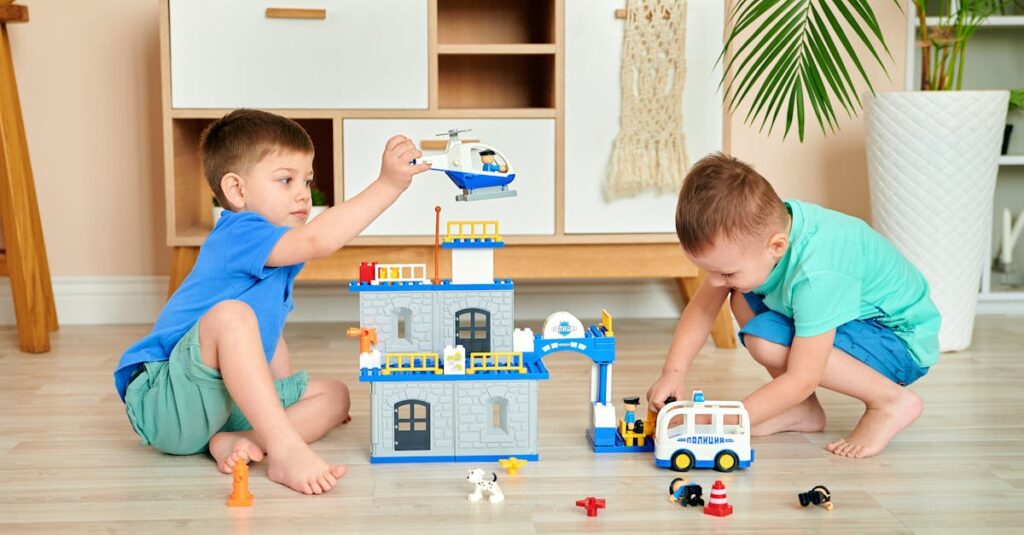Ever feel like your parenting style could rival a helicopter’s flight path? If you’re hovering over your child’s every move, it might be time to land that chopper. Helicopter parenting can feel like a full-time job, but it’s not exactly the best way to help kids grow into independent adults.
Table of Contents
ToggleUnderstanding Helicopter Parenting
Helicopter parenting represents an overprotective approach to child-rearing. This method, while often stemming from love and concern, can stifle a child’s ability to become independent.
Definition of Helicopter Parenting
Helicopter parenting involves parents closely monitoring their children’s activities and making decisions on their behalf. This parenting style prioritizes control over freedom, often leading to increased anxiety and dependency in children. It restricts opportunities for children to learn from their own choices, impacting their ability to develop critical life skills. Some experts suggest that an excessive focus on protecting children from failure can hinder their emotional and social growth.
Signs of Helicopter Parenting
Signs of helicopter parenting include constant supervision of children’s activities and frequent intervention in their tasks. Parents often respond to minor problems instead of letting children tackle challenges. An urge to manage children’s social interactions and academic performance is common. Additionally, overcommunication about even trivial matters can signal helicopter parenting. Children exhibiting signs of anxiety or fear of making mistakes often reflect the consequences of this style.
The Impact of Helicopter Parenting
Helicopter parenting significantly affects both children and parents. Understanding these impacts can help parents recognize the need for change.
Effects on Children
Children raised under helicopter parenting often struggle with independence. Anxiety levels increase as they fear making mistakes or facing consequences. Confidence in decision-making diminishes due to constant oversight. Many children develop an inability to solve problems without parental intervention. Social skills may suffer because opportunities for self-directed interactions are limited. Academic pressure may escalate, as parents push for high performance without allowing children to navigate their own challenges. Overall, helicopter parenting can stifle emotional growth, leading to dependency in adulthood.
Effects on Parents
Parents engaging in helicopter parenting often experience heightened stress. Worry about their children’s safety and success consumes their thoughts. This behavior can lead to burnout as they constantly manage their children’s lives. Relationships with children may become strained due to perceived overprotection. Many parents find themselves trapped in a cycle of controlling behaviors, impacting their satisfaction with parenting. Recognizing these effects is crucial for parents aiming to foster healthier dynamics and personal well-being.
Strategies to Stop Being a Helicopter Parent
Parents seeking to stop helicopter parenting can implement several effective strategies. Each strategy promotes a healthy balance between guidance and autonomy.
Encourage Independence
Fostering independence in children involves gradually allowing them to handle tasks on their own. Parents can start by giving kids small responsibilities, such as completing chores without assistance. This promotes confidence and decision-making skills. Encouraging participation in extracurricular activities also allows children to learn from their experiences. Additionally, celebrating their efforts rather than focusing solely on outcomes boosts self-esteem. Allowing children to make minor mistakes creates opportunities for growth. Each independence-boosting step lays the foundation for a more self-sufficient adult.
Set Healthy Boundaries
Establishing healthy boundaries helps parents give their children space to grow. Communicating clear expectations regarding responsibilities and consequences sets a framework for autonomy. Parents can avoid micromanaging by stepping back during age-appropriate activities. Monitoring social interactions without intruding fosters trust and independence. Conclusion of the activity encourages children to reflect on their experiences and decisions. Setting limits proves effective in promoting self-discipline without unnecessary oversight. These boundaries foster a healthy parent-child relationship and encourage personal growth.
Communicate Openly
Open communication serves as a vital tool in transitioning parenting styles. Discussing feelings and concerns allows for a deeper understanding of each other’s perspectives. Encouraging children to express their thoughts reinforces their sense of agency. Using active listening techniques, parents can demonstrate they value their child’s input. Regular family meetings provide a structured avenue for discussions, allowing everyone to voice opinions. Frequent check-ins promote transparency and trust within the family dynamics. Maintaining an open dialogue helps parents and children navigate this shift together, ultimately resulting in healthier relationships.
Seeking Support
Finding support from others can significantly help parents transition away from helicopter parenting. Engaging with like-minded individuals fosters discussion and learning.
Joining Parenting Groups
Connecting with parenting groups offers opportunities for shared experiences. These groups provide a platform for parents to discuss challenges and solutions. Listening to others’ stories can illuminate different perspectives on parenting. Workshops and events often hosted by these groups teach effective strategies for promoting child independence. Additionally, these communities can create a support network that eases the journey of adjusting parenting styles.
Consulting Professionals
Consulting professionals like child psychologists or family therapists presents an avenue for personalized guidance. These experts provide insights tailored to individual family dynamics. Families can explore various parenting techniques with a professional’s help, addressing specific needs. Experiencing structured sessions helps parents understand their behaviors and learn healthier approaches. Professionals can also assist in developing effective communication skills within the family, strengthening relationships and enhancing overall dynamics.
Transitioning away from helicopter parenting can be a transformative journey for both parents and children. By fostering independence and encouraging open communication parents can cultivate a nurturing environment that promotes growth and self-confidence. It’s essential to remember that allowing children to face challenges not only builds resilience but also strengthens their decision-making skills.
Seeking support from parenting groups or professionals can provide valuable insights and strategies to ease this transition. Embracing a balanced approach to parenting ultimately leads to healthier family dynamics and empowered children ready to navigate the world on their own. With patience and commitment parents can create a positive impact on their children’s lives while enhancing their own parenting experience.













